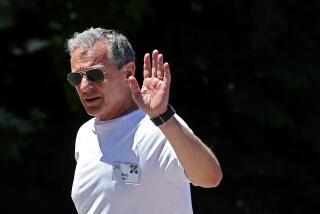Eisner Critic Losing Seat on Board of Directors
On Monday, Walt Disney Co. said four directors were leaving its board to help make the panel more independent after years of criticism that its members were too cozy with Chairman Michael D. Eisner.
Unsaid was that departing director Andrea Van de Kamp -- who emerged last year as one of Eisner’s harsher board critics -- vehemently objected and accused the chairman of orchestrating her removal, according to several Disney directors interviewed by The Times.
Van de Kamp declined Thursday to comment.
But in an e-mail to Eisner and some board members, Van de Kamp said she was being singled out by Eisner for having sided against him -- and with directors Stanley P. Gold and Roy Disney -- on various issues. Van de Kamp also complained in the e-mail that she had been treated unfairly and said she had been a good independent director, according to sources.
Gold and Disney, the company’s vice chairman, have become Eisner’s main critics on the board at a time when Eisner has been struggling to boost earnings and the company’s sagging stock price. Roy Disney is Walt Disney’s nephew. Gold is a longtime business associate.
Gold confirmed that Van de Kamp -- a longtime Southern California businesswoman and philanthropist who heads Sotheby’s West Coast operation -- was being asked to leave the board involuntarily and expressed his disappointment.
“It is not my policy to discuss Disney board matters outside the boardroom, but it is a shame that she is not being allowed to stand for reelection,” Gold said. “She was a good independent director, and I am saddened by the whole process.”
Disney spokeswoman Zenia Mucha said Thursday that the decision to retire the four directors came not from Eisner but from a four-member nominating and governance committee.
“Over the last year, Disney directors have undertaken a number of significant governance initiatives, including downsizing the board, and the slate of nominees selected by the independent governance and nominating committee was approved unanimously by the full board,” Mucha said.
The nominating committee includes directors John Bryson, Gary Wilson, Judith Estrin and Monica Lozano, according to the company’s latest proxy statement. The statement, issued this week, identified Van de Kamp as an independent director. Independent status means a director doesn’t have compromising ties to management.
Despite the claim of unanimity, Disney directors interviewed for this report said the specific vote on Van de Kamp’s removal was a split one. They said four of the company’s 17 directors objected, while at least three abstained. The disclosure comes at a sensitive time for Disney, which has been lauded over the last year on Wall Street and by shareholder groups for taking steps to improve corporate governance. In particular, the company has addressed criticism that its board has had too many directors with personal ties to Eisner.
Van de Kamp, 59, was one of four directors whose seats the board recommended be eliminated. The others were educator Reveta Bowers, actor Sidney Poitier and architect Robert A.M.Stern. Bowers and Poitier had made it known they wanted to leave. It is unclear whether Stern did.
In the Monday announcement, Disney said the four “will not stand for reelection.” Eisner also praised the four for their “invaluable contributions” and “for their support of sweeping governance enhancements.”
Directors said the names of the four leaving the board were submitted for a vote by the nominating committee, which was acting on a recommendation from Eisner.
According to directors interviewed, Eisner called Van de Kamp in Jan. 20 to tell her that she would no longer serve on the board because it was being trimmed from 17 to 13 members. The directors said Van de Kamp complained, resulting in a tense discussion between the two.
In a sweeping disclosure of ties and potential conflicts by directors, Disney acknowledged last year that Van de Kamp was chairwoman of the Performing Arts Center of Los Angeles when the entertainment company made a $5-million installment payment toward building the Walt Disney Concert Hall. It also said Van de Kamp was a director of the hall, but not a Disney board member, when the company made its original $25-million pledge.
More to Read
The biggest entertainment stories
Get our big stories about Hollywood, film, television, music, arts, culture and more right in your inbox as soon as they publish.
You may occasionally receive promotional content from the Los Angeles Times.










